Commenters on my What Are Your Thoughts on Educational Blogging? post asked if I would share the essence of my presentation from Alec Couros‘ s EC&I 831: Social Media & Open Education course — so as promised here it is!
You can watch an Elluminate recording of the session here.
Pre-presentation Preparation
One of the best aspects of Alec’s course is that participants post reflections on their blogs. Wouldn’t that be nice if you could research and interact with participants before every presentation to be better prepared?
By checking out their Shared Google Reader folder I was able to:
- Read their posts and leave some comments.
- Get a feel for who they are as individuals and where they are at
- Find out what they learnt in previous sessions
- Target my presentation based on my perception of their needs
Most of the participants are fairly new to using social media and blogging so I decided to focus on what they really needed to know about educational blogging.
Here’s What I Covered
I created the following diagram to explain how through the process of writing posts and engaging in discussions in comments we are constantly evaluating, reviewing, reflecting and revising information. And that by this continual process we’re learning.
Unfortunately I don’t feel I adequately emphasized how this learning is very different from how most of us are used to learning.
Nik Peachey provides a great summary in his comment “With out this final stage of reconstructing information and turning it into knowledge that is useable by others in my professional community, much of the information that I read or see on the web would just pass straight through me”.
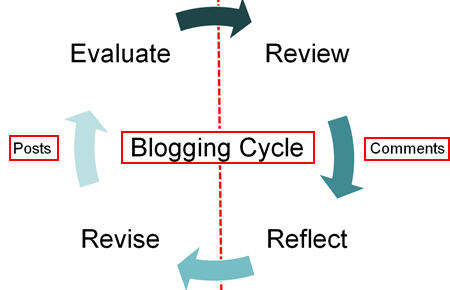
Community and learning as part of a community (or network) is one of the most important aspects of educational blogging and one of the key areas that most educators fail to appreciate.
The whole process of creating, connecting, communicating and collaborating as part of a community through the interactions of posts and conversations in comments is essential.
Unfortunately educators often fail to adequately encourage the community and commenting aspects in their student blogging programs.
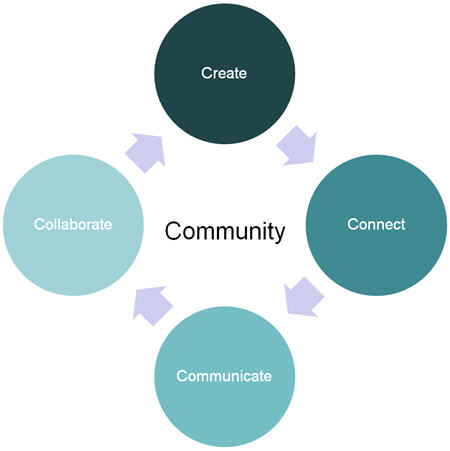
Here are a few examples of good approaches to student blogging:
- Jan Smith’s Huzzah class blog – starts her students on the class blog and gradually moves them onto their own student blogs.
- Sue Wyatt’s Student blogging challenge
It’s really important to experience how blogging changes your own learning to appreciate the impact it has and to understand how to use it effectively with students.
Here is the participants brainstorming of their thoughts, challenges and concerns based on where they are currently at with their blogging.
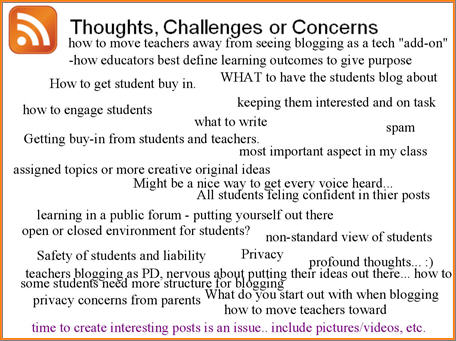
A key point I emphasized is their course provides them an excellent opportunity which is ideal for developing their blogging skills; they need to focus on working together as a community while gaining skills they can use with their own students.
My tips were:
Step 1: Change comment moderation settings
Currently they are all using the default comment moderation setting which means all commenters must have had a previously approved comment otherwise the comment is moderated.
Unfortunately in their situation this is negatively impacting in the comment conversations. New commenters don’t gain from reading older comments.
You change comment moderation settings by going to Settings > Discussion.
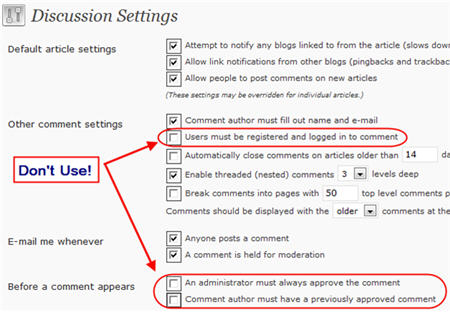
Step 2: Set up Google Reader
The best way to work as a community is to set up your Google Reader account so that you are subscribed to both posts and comments from all the blogs.
Here’s my instructions on how to Manage Comments and Posts On Blogs Using Google Reader.

Step 3: Engage in Conversations
They need to start focus more on learning off each other and engaging in conversations by:
- Reading each other posts – each of them will have different perspective on the topic and working collectively they will gain more than working individually
- Commenting on each others posts – take the time to share their thoughts in response to each others posts. To expand the conversation and really make each other think.
- Comment back to comments on their own posts – respond to people who leave comments. Use it as an opportunity to find out more information from the person who left the comment.
- Learn how to pingback on other bloggers posts
Final Thoughts
Alec asked me to frame a question for response by participants at the end of my session.
So I’ve asked them to write a post on “What are 3 questions (and why) you would like answered on educational blogging or building personal learning networks? so that I and the other participants could visit their posts and leave comments to answer their questions.
If you would like to ask me these same questions please feel free to write your own post and:
- Pingback my What Are Your Thoughts on Educational Blogging? post so I’m notified of your post
- And/or leave a comment with a link to your post on this post
Thanks to everyone who left comments on What Are Your Thoughts on Educational Blogging? — all participants have been asked to read through your comments!
Would also love to hear your thoughts. What would you have said differently? What else should I have included?
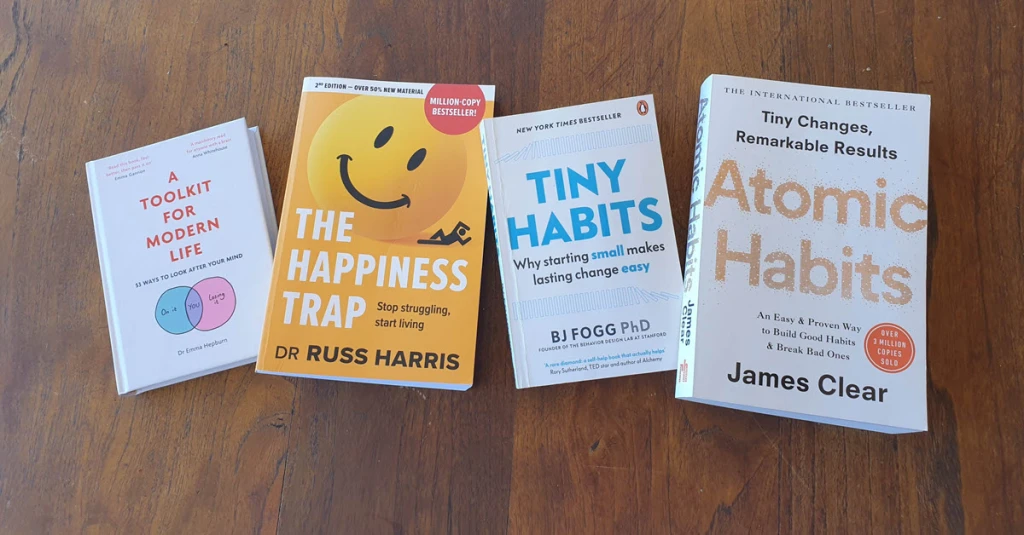
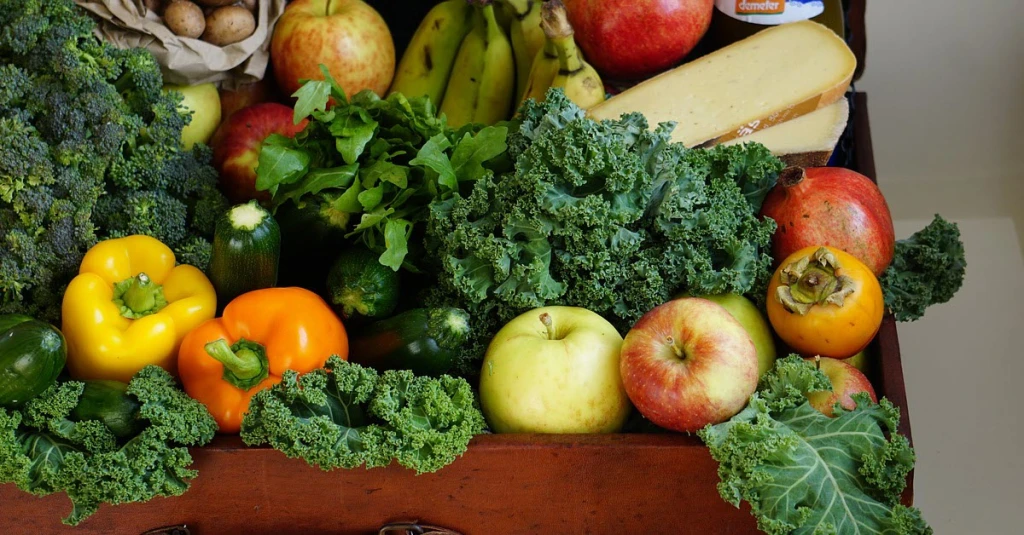

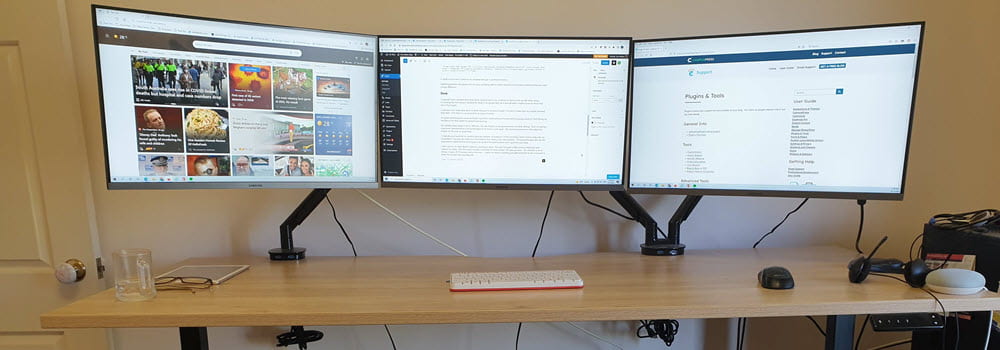
Leave a comment